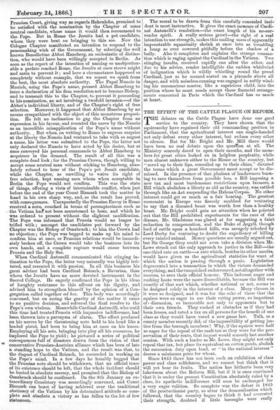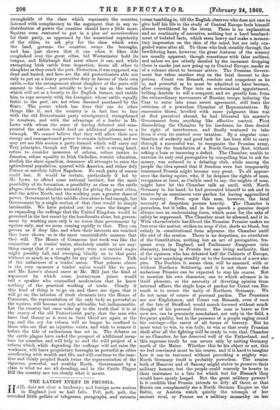THE EFFECT OF THE CATTLE PLAGUE ON REFORM.
THE debates on the Cattle Plague have done one good service to the country. They have shown, that the squirearchy have regained their old commanding position in Parliament, that the agricultural interest can single-handed not only defeat every other interest, but reduce every other to silence. But for Mr. Bright and Mr Mill there would have been no real debate upon the, question at all. The Ministry scarcely dared to open their mouths, and the mem- bers for great cities looked on in helpless perplexity, while men almost unknown either to the House or the country, but " a,cred up to their lips, consolled up to their chins," dictated the terms which a great Government must accept or be dis- missed. In the presence of that phalanx of landowners burn- ing to save themselves from possible loss, a Bill imposing a new tax and most burdensome restrictions upon farmers, a Bill which abolishes a liberty as old as the country, was rattled through like an Act suspending the Habeas Corpus. No other interest could get so much as a, fair hearing. The greatest economist in Europe was fiercely snubbed for venturing to say that a diseased beast was worth less than a healthy beast. Mr. Bright could gain no attention when he pointed out that the Bill prohibited. experiments for the cure of the disease, Mr. Gladstone was glared at for suggesting a faint reduction in compensation, and the Duke of Argyll, though lord of cattle upon a hundred hills, was savagely rebuked by Lord Derby for venturing to doubt the expediency of killing every tainted animal Money questions are usually argued out, but Sir George Grey could not even take a division when Mr. Lowe struck out the only approach to justice in. the Bill—the one-third rate on cattle—a rate which, besides its other merits, would have given us the agricultural statistics for want of which the nation is passing through a panic. Legislation degenerated into a transaction in which the victors demanded everything, and the vanquished endeavoured, not altogether with success, to save their official honour. This indecent anger and rushing haste were the more discreditable, because the Bill was exactly of that sort which, whether national or not, seems to be designed solely in the interest of a class. Many clauses in it were so designed, and it was for the sake of these that the squires were so eager to use their voting power, so impatient of • discussion, so inexorable not only to opponents but to their own friends. They rushed at obstacles as if they had been fences, and voted a tax on all persons for the benefit of one class as they would have voted a new game law. Talk, as a county member recently did, of the impossibility of getting jus- tice from the borough members ! Why, if the squires were half as eager for the repeal of the malt tax as they were for the pre- servation of their rents, that impost would scarcely last another session. With such a leader as Mr. Lowe, they might not only repeal that tax, but place its equivalent on cotton goods, abolish the succession duty upon land, or " in the national interest " decree a minimum price for wheat. Since 1845 there has not been such an exhibition of class power and class selfishness, and we cannot but think that it will yet bear its fruits. The nation has hitherto been very lukewarm about the Reform Bill, but if it is once convinced that it is under the present Constitution absolutely ruled by a class, its apathetic indifference will soon be exchanged for a very eager volition. So complete was the defeat in 1845 of the proctectionist party, so utter the demoralization which followed, that the country began to think it had overrated their strength, doubted if little boroughs were really strongholds of the class which represents the counties, listened with complacency to the argument that in any re- distribution of power the counties should have a little more. Squires even ventured to put in a plea ad misericordiam for their party, as oppressed by the numerical superiority of the cities, to ask pity for the class which owns the land, governs the counties, sways the boroughs, and has just shown that it can when it likes ride roughshod over the great cities, bid Westminster hold its tongue, and Edinburgh find meat where it can, and, while exempting Irish cattle from inspection; doom all other to slaughter as they reach the port. Protection, it was supposed, was dead and buried, and here are the old protectionists able not only to put on a heavy protective duty in favour of their own cattle,—for the arrangement about slaughter at the ports will amount to that,—but actually to levy a tax on the nation which will act as a bounty to the English farmer, and enable him to cope securely with the foreigner, whose cattle, equally liable to the pest, are not when diseased purchased by the State. The power which has done this can do other things like it, and the country is in fact face to face with the old Protectionist party reinvigorated, strengthened in numbers, and with the advantage of a leader in Mr. Lowe with whom the sense of having defeated and exas- perated the nation would lend an additional pleasure to a triumph. We cannot believe that they will allow their new energy and unacaustomed power to remain infructuous, and we may yet see this session a party formed which will carry out Tory principles, though not Tory ideas, with a strong hand, refuse to consider measures of reform, refuse justice to Jamaica, refuse equality to Irish Catholics, restrict education, abolish the slave squadron, denounce all attempts to raise the agricultural population, quarrel with America, and either defy France or servilely follow Napoleon. No such party of course could last. It would be certain, particularly if led by Mr. Lowe, to offend some national instinct, but the mere possibility of its formation, a possibility as clear as the cattle plague, shows the absolute necessity for giving the great cities, -and the active North, and the working man a greater share of -power. Government bythe middle class alone is bad enough, but Government by a single section of that class would be simply intolerable. We have pointed out for years the danger of so expanding the suffrage that the United Kingdom would be governed in the last resort by the handicrafts alone, but govern- ment by working men only is no worse than government by squires only, and we seem coming rapidly to that. They can govern us if they like, and when their interests are touched they have shown us in the most unmistakable manner that they will. The House of Commons last week was like the committee of a trades' union, absolutely unable to see any- thing except that if a certain point were not carried wages might possibly fall, and sweeping blindly on to that point without so much as a thought for any other interests. Talk of the unfairness of a trades' union. That poleaxe clause is the very measure a trades' union would like to pass, and Mr. Lowe's absurd sneer at Mr. Mill just the kind of argument by which some journeyman joiner would tell a speaker who counselled moderation that he knew nothing of the practical working of trade. Clearly if this kind of thing is to go on, and there are signs that it will go on, the infusion of fresh elements into the House of Commons, the representation of the only body as powerful as the squires, will become not only advisable, but indispensable. Let the country but once wake up to the truth that it is at the mercy of the old Protectionist party, that the men who have that theory as it were in their blood are again at the top, and the cry for reform will no longer be confined to those who see that an injustice exists, and wish to remove it before the tide of enthusiasm has set in. The debates on the cattle plague have ended the prospect of additional mem- bers for counties, and will help to end the wild project of a reform which while degrading the suffrage will not raise the workmen, will leave proprietary boroughs as powerful as cities overflowing with wealth and life, and will continue to the inac- tive and thinly peopled South twice the representation of the vigorous, powerful, and wealthy North. Government by a class is what we are all dreading, and in the Cattle Plague Bill the country saw too clearly what it meant.































 Previous page
Previous page